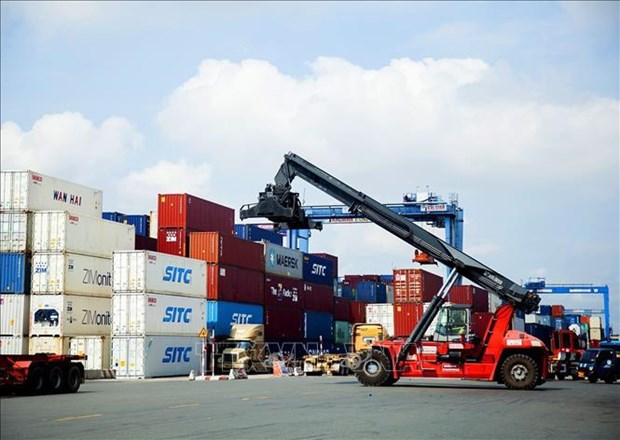In October, the country's total export and import value was estimated at $58.27 billion, up 0.1 per cent month on month and 5.7 per cent year on year, the GSO said on October 29.

Viet Nam posted a trade surplus of US$9.4 billion in the first ten months of 2022, compared to $630 million in the same period last year, according the General Statistics Office (GSO).
In October, the country's total export and import value was estimated at $58.27 billion, up 0.1 per cent month on month and 5.7 per cent year on year, the GSO said on October 29.
The 10-month foreign trade stood at about $616.24 billion, up 14.1 per cent from the same period last year.
That included $312.82 billion in exports, rising 15.9 per cent, with $80.36 billion coming from the domestic sector (up 13.4 per cent) and $232.46 billion from the foreign invested sector (up 16.8 per cent).
Thirty-two commodities recorded export revenue of over $1 billion each during the period, accounting for 92.8 per cent of total overseas shipments. Among them, six brought home over $10 billion each, making up 64.1 per cent.
Meanwhile, Viet Nam imported about $303.42 billion worth of goods, increasing 12.2 per cent year on year, with the domestic sector accounting for $105.28 billion (up 12.5 per cent) and the foreign invested sector, $198.14 billion (up 12 per cent).
Forty-four commodities posted import value of over $1 billion each, accounting for 93 per cent of the total imports. Four of them saw this figure at over $10 billion each, accounting for 52.7 per cent, statistics showed.
Between January and October, the US was the largest importer, purchasing some $93.4 billion worth of Vietnamese goods. China ranked first among exporters when shipping $100.7 billion worth of goods to Viet Nam.
Meanwhile, agro-forestry-aquatic product exports and imports totalled $82.1 billion in the ten months, rising 10.2 per cent from the same period last year, said the Ministry of Agriculture and Rural Development.
That consisted of more than $44.9 billion in exports (up 14.1 per cent) and $37.2 billion in imports (up 5.8 per cent), resulting in a trade surplus of $7.7 billion (up 83.7 per cent).
Since the year’s beginning, eight products/groups of products have generated over $2 billion in export revenue each, namely coffee, rubber, rice, fruits and vegetables, cashew nuts, shrimp, tra fish, and wood products.
The US has bought more than $11.4 billion worth of agro-forestry-aquatic products from Viet Nam, accounting for 25.4 per cent of total exports and remaining the latter’s biggest import market. It was followed by China ($8.3 billion, 18.5 per cent) and Japan ($3.5 billion, 7.8 per cent).
Spectacular achievement
Viet Nam is on track to see a trade surplus of $10 billion this year despite enduring global market uncertainties and fluctuations, Minister of Trade and Industry Nguyen Hong Dien reported at the ongoing fourth session of the 15th National Assembly last weekend.
This is certainly a spectacular achievement for Viet Nam this year, stressed the minister.
He attributed these positive results to solutions the Government, ministries, and especially the business community have implemented to stimulate consumption demand and connect product consumption outlets in order to promote trade exchanges.
Dien recalled that despite facing the negative impact caused by the COVID-19 pandemic, Viet Nam’s total foreign trade turnover last year hit $668 billion, making the country one of the 20 largest economies in the world in terms of international trade.
He went on to say that export businesses no longer rely on key markets but have branched out to new ones. Decreasing demand coupled with high inflation in major markets such as China, Europe, Japan, and the US have forced local businesses to return to the Eastern European market.
Furthermore, the effective application of e-commerce services has enabled Vietnamese commodities to reach more overseas markets. Currently, the country’s e-commerce sales have fetched approximately $14 billion, with the figure projected to rise to up to $18 billion for the whole year. — VNS





